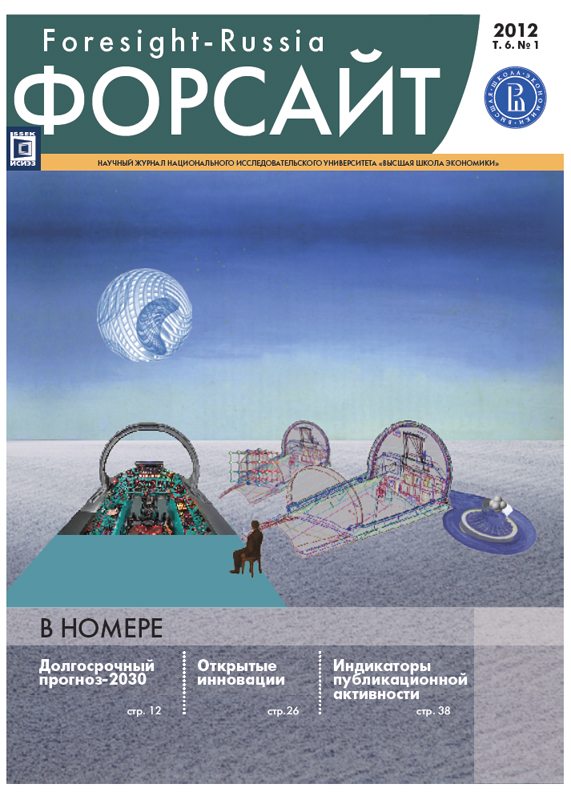Abstract
This paper reviews national features in the general evolution of science and technology (S&T) foresight over the last decade. Foresight has made a transition from thematic papers and policy briefs to a complex set of methods integrated in the framework of S&T and innovation policy making. Foresight also addresses broad social and economic issues along with conventional S&T problems. It focuses often on interdisciplinary fields and cross-sector problems. It has witnessed the introduction of such new methods as weak signals and wild cards, and it has benefitted from the integration of qualitative and quantitative approaches.
Russian S&T foresight follows global trends. It has given support for revisions of the national S&T priorities and critical technologies. In 2007-2010, two cycles of the National S&T Foresight (initiated by the Ministry of Education and Science of the Russian Federation) were completed. They resulted in the creation of frameworks and expert networks for future studies. Foresight culture has been finding deeper roots in Russia.
The paper addresses mainly the key features of the third (ongoing) cycle of the national S&T Foresight (2011) against the background of the first two cycles and the international trends. This cycle represents a wider coverage of issues (macroeconomic scenarios, trends in basic research, S&T resources, future demand for skills, and global drivers of S&T developments); more complicated methodologies (bibliometric analysis, expert panels, surveys, roadmapping, and quantitative models); and a combination of “market pull” and “technology push” approaches toward estimating future developments. This cycle is building a wider network of experts at new Foresight centres at various Russian research universities. It concludes with a discussion of some barriers still to be overcome in Foresight studies: integration of sectoral visions, deeper analyses of some scientific disciplines, stronger integration into policy making, and spreading among business and research communities.
References
Amanatidou E. (2011) Grand challenges -a new framework for foresight evaluation. Paper presented at the EU-SPRI conference 20-22 September. Manchester.
Calof J.L. (2008) Competitive Intelligence and the Management Accountability Framework. Optimum Online//The Journal of Public Sector Management. № 37(4). P. 31-36.
Dalkey N.C., Helmer-Hirschberg O. (1962) An Experimental Application of the Delphi Method to the Use of Experts. RAND, RM-727-PR.
European Commission (2006) Emerging Science and Technology Priorities in Public Research Policies in EU, US and Japan. Brussels.
European Commission (2010) European Forward Looking Activities. EU Research in Foresight and Forecast. Brussels.
Georghiou L., Cassingena Harper J., Keenan M., Miles I., Popper R. (eds.) (2008) The Handbook of Technology Foresight: Concepts and Practice. Edward Elgar Publishing.
Haegeman K., Scapolo F., Ricci A., Marinelli E., Sokolov A. (2012) Quantitative and qualitative approaches in FTA: From combination to integration?//Technological Forecasting and Social Change (forthcoming).
Loveridge D., Georghiou L., Nedeva M. (1995) United Kingdom Foresight Programme. University of Manchester.
Martin B.R., Irvine J. (1989) Research Foresight: Priority-Setting in Science. London, New York: Pinter Publishers.
Meissner D., Sokolova A. (2012) Assessing national Foresight studies -an approach to make Foresight studies comparable//Gokhberg L., Meissner D., Sokolov A. (eds.) Designing and Implementing Future Oriented STI Policy -Potentials and Limits of Foresight Studies. Springer (forthcoming).
NISTEP (2010) Contribution of Science and Technology to Future Society. Summary on the 9th Science and Technology Foresight. Tokyo.
OECD (2010) The OECD Innovation Strategy. Getting a Head Start on Tomorrow. Paris.
OECD (2011) OECD Reviews of Innovation Policy. Russian Federation. Paris.
Popper R. (2009) Mapping Foresight: Revealing how Europe and other world regions navigate into the future. Luxembourg: Publications Office of the European Union.
Popper R. (2011) Wild Cards and Weak Signals Informing and Shaping Research and Innovation Policy. Paper presented at the Fourth International Seville Conference on Future-Oriented Technology Analysis (FTA): FTA and Grand Societal Challenges -Shaping and riving Structural and Systemic Transformations. Seville, 12-13 May.
Popper R., Georghiou L., Miles I., Keenan M. (2010) Evaluating Foresight: Fully-Fledged Evaluation of the Colombian Technology Foresight Programme (CTFP). Cali: Universidad del Valle.
UNIDO (2005) UNIDO Technology Foresight Manual. Vienna.
Апокин А.Ю., Белоусов Д.Р. (2009) Сценарии развития мировой и российской экономики как основа для научно-технологического прогнозирования//Форсайт. Т. 3. № 3. С. 12-29.
Гохберг Л.М., Кузнецова Т.Е. (2011) Стратегия-2020: новые контуры российской инновационной политики//Форсайт. Т. 5. № 4. С. 8-30.
Денисов Ю.Д., Соколов А.В. (1998) Технологическое прогнозирование и научно-технические приоритеты в индустриально развитых странах. М.: ЦИСН.
Дуб А.В., Шашнов С.А. (2007) Инновационные приоритеты для энергетического машиностроения: опыт отраслевого Форсайта//Форсайт. № 3 (3). С. 4-11.
Кара-Мурза С.Г. (2008) Экспертное сообщество России: генезис и состояние. http://www.situation.ru/app/rs/books/articles/expert.htm.
Карасев О.И., Вишневский К.О. (2010) Прогнозирование развития новых материалов с использованием методов Форсайта//Форсайт. Т. 4. № 2. С. 58-67.
Карасев О.И., Соколов А.В. (2009) Форсайт и технологические дорожные карты для наноиндустрии//Российские нанотехнологии. Т. 4. № 3-4. С. 8-15.
Кинэн М. (2007) Форсайт приходит в Россию//Форсайт. № 1 (1). С. 6-7.
Кристенсен К. (2004) Дилемма инноватора. Как из-за новых технологий погибают сильные компании. М.: Альпина Паблишер.
Николаев И.А. (1995) Приоритетные направления науки и технологий. М.: Машиностроение.
Соколов А.В. (1999) О конкурентоспособности российских технологий//Промышленная политика в Российской Федерации. № 4. С. 23-35.
Соколов А.В. (2007) Метод критических технологий//Форсайт. Т. 1. № 4. С. 64-74.
Соколов А.В. (2009) Будущее науки и технологий: результаты исследования Дельфи//Форсайт. Т. 3. № 3. С. 40-58.
Чулок А.А. (2009) Прогноз перспектив научно-технологического развития ключевых секторов российской экономики: будущие задачи//Форсайт. Т. 3. № 3. С. 30-36.
Шашнов С.А. (2007) Форсайт Республики Башкортостан//Форсайт. № 1(1). С. 16-24.
ван Рай В. (2012) Зарождающиеся тенденции и «джокеры» как инструменты формирования и изменения будущего//Форсайт. Т. 6. № 1. C. 60-73.

This work is licensed under a Creative Commons Attribution 4.0 International License.

